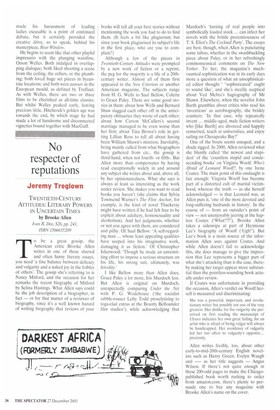respecter of reputations
Jeremy Treglown
TWENTIETH-CENTURY ATTITUDES: LITERARY POWERS IN UNCERTAIN TIMES by Brooke Allen Ivan R. Dee, $26, pp. 241, ISBN 1566635209 To be a great gossip, the American critic Brooke Allen writes in one of these shrewd and often funny literary essays, you need 'a fine balance between delicacy and vulgarity and a naked joy in the foibles of others'. The gossip she's referring to is Nancy Mitford, and the occasion for her remarks the recent biography of Mitford by Selina Hastings. What Allen says could be the job description of a biographer, in fact — or for that matter of a reviewer of biography, since it's a well known hazard of writing biography that reviews of your
books will tell all your best stories without mentioning the work you had to do to find them. (It feels a bit like plagiarism; but since your book plagiarised its subject's life in the first place, who are you to complain?)
Although a few of the pieces in Twentieth-Century Attitudes were prompted by a new work of fiction or a reprint, the peg for the majority is a life of a 20thcentury writer. Almost all of them first appeared in the New Criterion or another American magazine. The subjects range from H. G. Wells to Saul Bellow. Colette to Grace Paley. There are some good stories in them: about how Wells and Bernard Shaw slagged each other off in the anticipatory obituaries they wrote of each other; about how Carson McCullers's second marriage managed to be even worse than her first; about Tina Brown's role in getting Lillian Ross to tell all about having been William Shawn's mistress. Inevitably, being mainly culled from what biographers have gathered from etc., the gossip is third-hand, when not fourthor fifth-. But Allen more than compensates by having read exceptionally widely in and around any subject she writes about and, above all, by her opinionatedness. What she says is always at least as interesting as the work under review. She makes you want to read books you haven't (she claims that Sylvia Townsend Warner's The Flint Anchor, for example, is the kind of novel Thackeray might have written if he had felt free to be explicit about adultery, homosexuality and alcoholism). And her judgments, whether or not you agree with them, are considered and pithy. Of Saul Bellow: 'A self-regarding man ... whose least appealing qualities have seeped into his imaginative work, damaging it as fiction.' Of Christopher Isherwood: 'Though he made an unremitting effort to impose a serious structure on his life, his strong suit, ultimately, was frivolity.'
I like Bellow more than Allen does, Grace Paley a lot more, Iris Murdoch less. But Allen is original on Murdoch, unexpectedly comparing Under the Net with P. G. Wodehouse ('the socialist rabble-rouser Lefty Todd proselytising to toga-clad extras at the Bounty Belfounder film studios'), while acknowledging that Murdoch's 'turning of real people into symbolically loaded stock ... can infect her novels with the brittle pretentiousness of T. S. Eliot's The Cocktail Party'. The essays are best, though, when Allen is puncturing some taboo, whether in the swashbuckling piece about Paley, or in her refreshingly commonsensical comments on The New Yorker. To her, the magazine's muchvaunted sophistication was in its early days more a question of what an unsophisticated editor thought "sophisticated" ought to sound like', and she's steelily sceptical about Ved Mehta's hagiography of Mr Shawn. Elsewhere, when the novelist John Barth grumbles about critics who read his 'inventions' as autobiography, she briskly counters: 'In that case, why repeatedly invent ... middle-aged, male fiction writers who [like Barth] are divorced and happily remarried, teach at universities, and enjoy sailing on Chesapeake Bay?'
One of the bouts seems unequal, and a shade rigged. In 2000, Allen reviewed what she bluntly called 'the newest and stupidest' of the 'countless stupid and condescending books' on Virginia Woolf: Who's Afraid of Leonard Woolf?. by one Irene Coates. The main point of this onslaught is fair enough: Virginia Woolf has become part of a distorted cult of marital victimhood, whereas the truth — as she herself acknowledged — is that Leonard was, as Allen puts it, 'one of the most devoted and long-suffering husbands in history'. In the course of — from an outsider's point of view — not unenjoyably jeering at the hapless Coates ('What??'), Brooke Allen takes a sideswipe at part of Hermione Lee's biography of Woolf ('UOW). But Lee's book is a main source of the information Allen uses against Coates. And while Allen doesn't fail to acknowledge this, she does manage to give the impression that Lee represents a bigger part of what she's attacking than is the case, thereby making her target appear more substantial than the pointless-sounding book actually under review.
If Coates was unfortunate in providing the occasion, Allen's verdict on Woolf herself is measured and discriminating:
She was a powerful, important, and revolutionary writer hut possibly not one of the very greatest. Her dislike for the vulgarity she perceived on first reading the manuscript of Ulysses indicates her own great failing, for an artist who is afraid of being vulgar will always he handicapped. Her avoidance of vulgarity led her too often to vulgarity's opposite. „ preciosity.
Allen writes freshly, too, about other early-to-mid-20th-century English novelists such as Henry Green, Evelyn Waugh and — as her title suggests — Angus Wilson. If there's not quite enough in these 200-odd pages to make the Chicagopublished book worth rushing to order from amazon.com, there's plenty to persuade one to buy any magazine with Brooke Allen's name on the cover.


























































 Previous page
Previous page